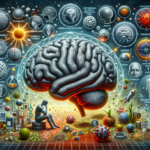Introduction to Dementia
Dementia is a term that encompasses a range of neurological conditions characterized by a decline in cognitive function. It affects memory, thinking, and social abilities, severely impacting daily life. Understanding the causes and early signs of dementia is crucial for early intervention and management. In this article, we explore the early causes of dementia in individuals in their 60s, the main causes of dementia, and the early signs that may indicate its onset.
Early Causes of Dementia in the 60s
While aging is a significant risk factor for dementia, it is not the sole cause. In individuals in their 60s, several factors can contribute to the early onset of dementia. Genetics play a crucial role, with a family history of dementia increasing the risk. Additionally, lifestyle factors such as poor diet, lack of exercise, and smoking can accelerate cognitive decline. Chronic health conditions like diabetes, hypertension, and high cholesterol also contribute to the risk.
Environmental factors are equally important. Exposure to toxins and head injuries can damage brain cells, leading to dementia. Moreover, mental health issues such as depression and chronic stress have been linked to an increased risk of cognitive decline. Addressing these factors through a healthy lifestyle and regular medical check-ups can mitigate the risk and potentially delay the onset of dementia.
Main Causes of Dementia
Dementia results from damage to brain cells, affecting their ability to communicate. This damage can be caused by various factors, including neurodegenerative diseases, vascular issues, and lifestyle choices. Alzheimer’s disease is the most common cause, accounting for 60-80% of cases. It is characterized by the accumulation of amyloid plaques and tau tangles in the brain.
Vascular dementia, caused by impaired blood flow to the brain, is another significant cause. It often results from strokes or other conditions affecting blood vessels. Other causes include Lewy body dementia, frontotemporal dementia, and mixed dementia, where multiple types coexist. Understanding these causes can help in developing targeted treatment and management strategies.
Early Signs of Dementia
Recognizing the early signs of dementia is vital for timely intervention. Memory loss, particularly forgetting recent events or information, is a common early sign. Individuals may also experience difficulty in planning or solving problems, struggling with tasks that require concentration.
Changes in mood and personality, such as increased confusion, depression, or anxiety, can also indicate the onset of dementia. Language problems, including difficulty finding the right words or following conversations, are common. Additionally, individuals may exhibit poor judgment or decision-making skills.
It’s important to note that these signs can vary and may develop gradually. Consulting a healthcare professional for a thorough assessment is crucial if these symptoms are observed.
Conclusion
Dementia is a complex condition with various causes and early signs. Understanding these aspects can aid in early detection and management, improving the quality of life for those affected. By addressing lifestyle factors, managing chronic conditions, and staying informed, individuals can reduce their risk and potentially delay the onset of dementia. Early intervention is key, and seeking medical advice at the first signs can make a significant difference.








